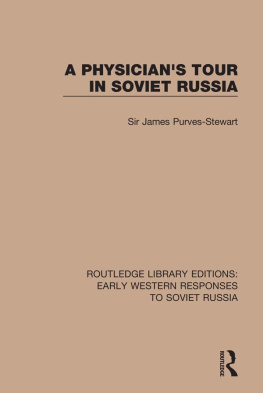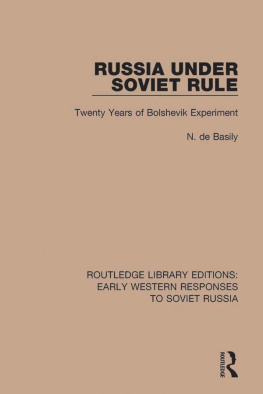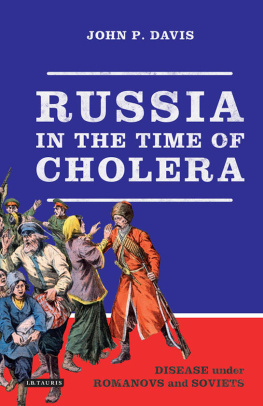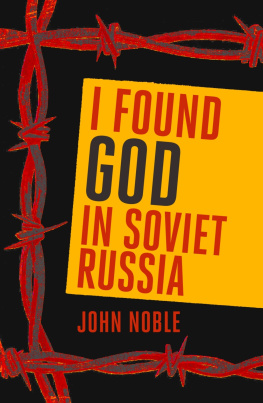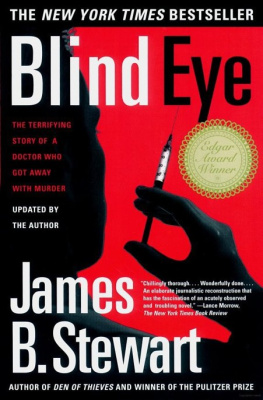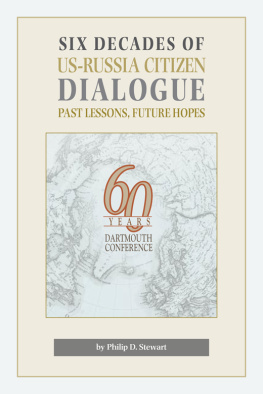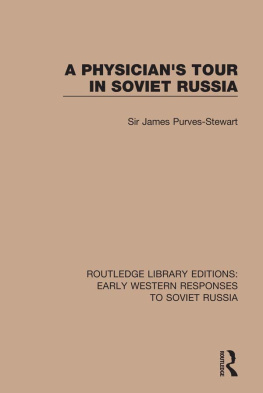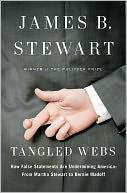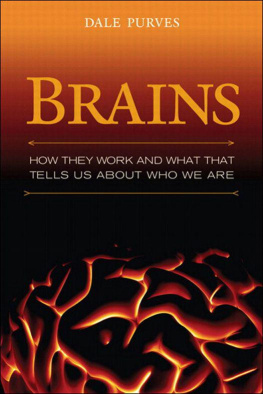ROUTLEDGE LIBRARY EDITIONS: EARLY WESTERN RESPONSES TO SOVIET RUSSIA
Volume 14
A PHYSICIANS TOUR IN SOVIET RUSSIA
A PHYSICIANS TOUR IN SOVIET RUSSIA
SIR JAMES PURVES-STEWART
First published in 1933 by George Allen & Unwin Ltd
This edition first published in 2018
by Routledge
2 Park Square, Milton Park, Abingdon, Oxon OX14 4RN
and by Routledge
711 Third Avenue, New York, NY 10017
Routledge is an imprint of the Taylor & Francis Group, an informa business
1933 James Purves-Stewart
All rights reserved. No part of this book may be reprinted or reproduced or utilised in any form or by any electronic, mechanical, or other means, now known or hereafter invented, including photocopying and recording, or in any information storage or retrieval system, without permission in writing from the publishers.
Trademark notice: Product or corporate names may be trademarks or registered trademarks, and are used only for identification and explanation without intent to infringe.
British Library Cataloguing in Publication Data
A catalogue record for this book is available from the British Library
ISBN: 978-1-138-04993-2 (Set)
ISBN: 978-1-315-11072-1 (Set) (ebk)
ISBN: 978-1-138-08298-4 (Volume 14) (hbk)
ISBN: 978-1-315-11219-0 (Volume 14) (ebk)
Publishers Note
The publisher has gone to great lengths to ensure the quality of this reprint but points out that some imperfections in the original copies may be apparent.
Disclaimer
The publisher has made every effort to trace copyright holders and would welcome correspondence from those they have been unable to trace.

A PHYSICIANS TOUR IN SOVIET RUSSIA
by
SIR JAMES PURVES-STEWART
K.C.M.G., C.B.
With reproductions of four Russian Cartoons
LONDON
GEORGE ALLEN & UNWIN LTD
MUSEUM STREET
FIRST PUBLISHED IN JANUARY 1933
SECOND IMPRESSION JULY 1933
All rights reserved
THE following notes were made by a practising physician from London during a months visit to Russia in the summer of 1932. They make no claim to offer anything more than a transient view of the constantly changing conditions of Russian life. To those who knew Russia before the Great War, the present picture will be almost unrecognizable; what a future generation will think, cannot be foretold.
Seen as they are, through medical eyes, the salient points are bound to be different than had the observer been, say, an artist or a journalist; yet even to non-medical readers it is hoped they may perhaps be of interest.
CONTENTS
ILLUSTRATIONS
ON BOARD M/V DJERJINSKY
OF THE SOVIET MERCHANT FLEET
August 14, 1932
All of us passengers were warned to be on board at Hays Wharf, London Bridge, by 8 p.m. last night. Everything was well arranged: porters to carry ones baggage; guides to steer one to the correct cabin. A specially industrious sailor took great trouble in collecting my kit. I attempted to tip him. He refused, with great decision.
The service in the cabins is very smart. We went off to breakfast this morning, leaving our stateroom in a chaotic mess. On our return, half an hour later, everything was spick and span.
This is a propagandist ship. The saloon is adorned with a portrait of the hero Djerjinsky, founder and arch-terrorist of the Tche-Ka during the Russian Revolution. The walls of the smoking-room are decorated with water-colours depicting revolutionist processions, all with red banners showing the Soviet hammer and sickle. Even the ships inkpots have this last device embossed on them, together with the red star of the U.S.S.R.
Up till the time when we left the dock-side, an enterprising newsagent on the middle deck did a brisk trade in communistic propagandamagazines, newspapers, and novels.
We did not weigh anchor till 11.30 p.m., by which time my fellow-traveller and old friend, Dr. Frederick Green, M.C., was wisely asleep in his cabin. Everything is clean and tidy; the stewards prompt and polite. The whole of the first-and second-class accommodation is full up; the steerage has only about a dozen people.
This morning we held a meeting of the doctors and scientists party, to which we belong. This tour of ours has been organized by the S.C.R., or Society for Cultural Relations between the Peoples of the British Commonwealth and the U.S.S.R. At present we are fourteen in number, but another six or seven have gone in advance by an earlier ship and will join our party at Leningrad. We called the roll; each of us stood up in turn and was identified by the rest. We comprise amongst us physicians, surgeons, biologists, public health officials, teachers of biology, medical students, and a skilled engineer. We duly elected a chairman and a secretary.
This evening, after dinner, we attended an address by Lord My upon present economic conditions in Russia. Lord My is a Labour peer who is leading a party of his own to Russia. He has already been there himself. He is a clear and persuasive speaker and evidently an enthusiastic pro-Bolshevist.
According to his statements, the standard of living to-day in Russia is about 60 per cent above that of 1913 and is still rising. The average monthly wages of a Russian family are estimated at 150 roubles. Assuming the rouble at 3 shillings, the government exchange-rate, this would be equivalent to 22 IOS., or about 15 shillings a day. Necessities such as bread, milk, clothes, are rationed, both as to quantity and price, the official prices being very cheap. Rent is based on the government allotment of space, each person being entitled to 9 cubic metres, rented at 40 kopecks per cubic metre. If a worker receives a wage of 125 or 150 roubles a month, he pays a basic rent, amounting to not more than 10 per cent of his earnings. If his monthly wage exceeds 150 roubles, his rent for the same accommodation is correspondingly raised; thus for identical accommodation two adjacent families may pay different rents.

